Back when I started writing this blog I thought I would write about speakers, headphones, amplifiers and the like. Multiple sockets, though? No, I did not imagine that. But hey, we’ve got to be open-minded, right? So when the kind people over at iFi asked me if I wanted to review their newest creation, the massive iFi PowerStation, I said “why not?”. And I’m glad I did, because the PowerStation is a bit of a holy grail to my noise-ridden setup. It’s not really the ultimate solution as it doesn’t take all the noise away, but it removes a chunk that’s large enough for it to be barely noticeable. Believe it or not, iFi did it!
As a humorous aside, I did some research on how you call these things in English… and it’s unbelievable the amount of names they have, differing from region to region and even with some hilarious (for a non-native) names such as power bar. The English language really is fun!
Disclaimer: I received this unit on loan from iFi. Additional information is available on their website. It retails for £499/€549/$499.
TL;DR: recap
| Pros |
Cons |
| Superb build quality
Removes a lot of unwanted noise |
Expensive
Only justified if you have loud electrical noise in your system |
Rating: 9/10
Packaging & Accessories
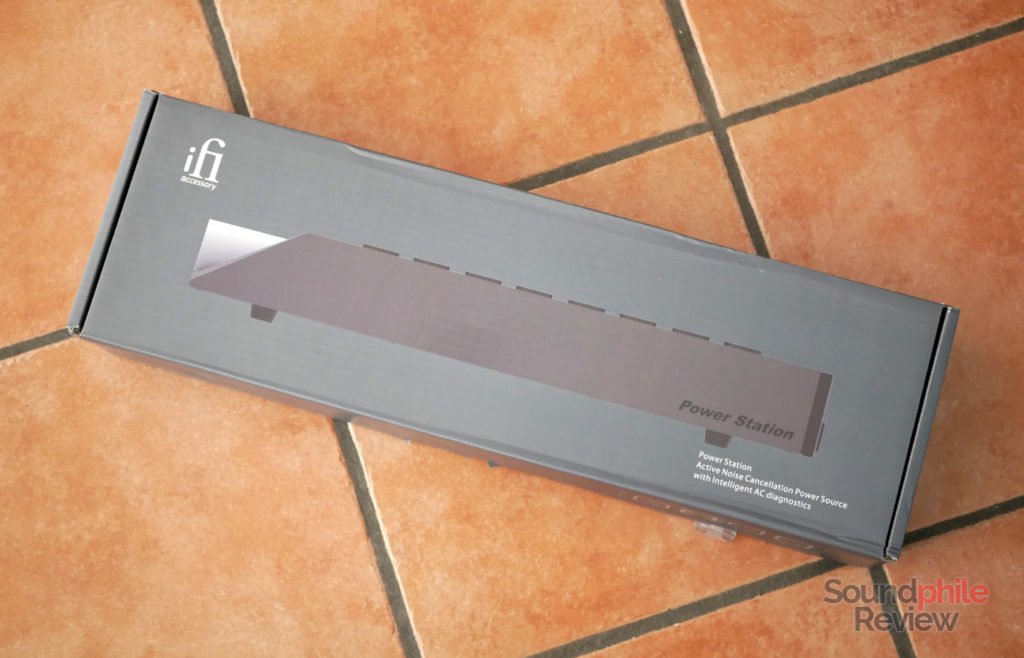
Packaging is massive just as its content. The cardboard box is large and heavy, but it only contains the PowerStation and the power cable. That’s it!
Design & Build
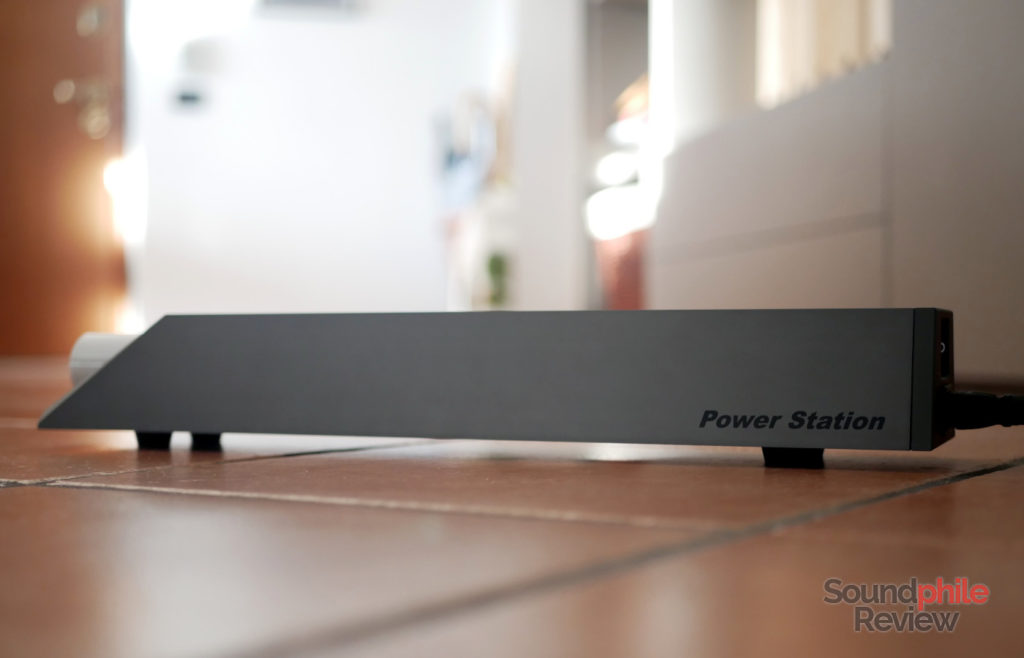
Apart from the very cool name which for some reason reminds me of a famous Pink Floyd cover art, the iFi PowerStation looks like a sci-fi tank and is built like one. It’s all sharp edges and hard lines, and this lends it a futuristic look and an imposing look. All the parts are made of metal, with the sockets and the power switch being the only parts made of plastic. Four screws hold each socket in place. On the underside there are four large rubber feet, again held in place with screws.
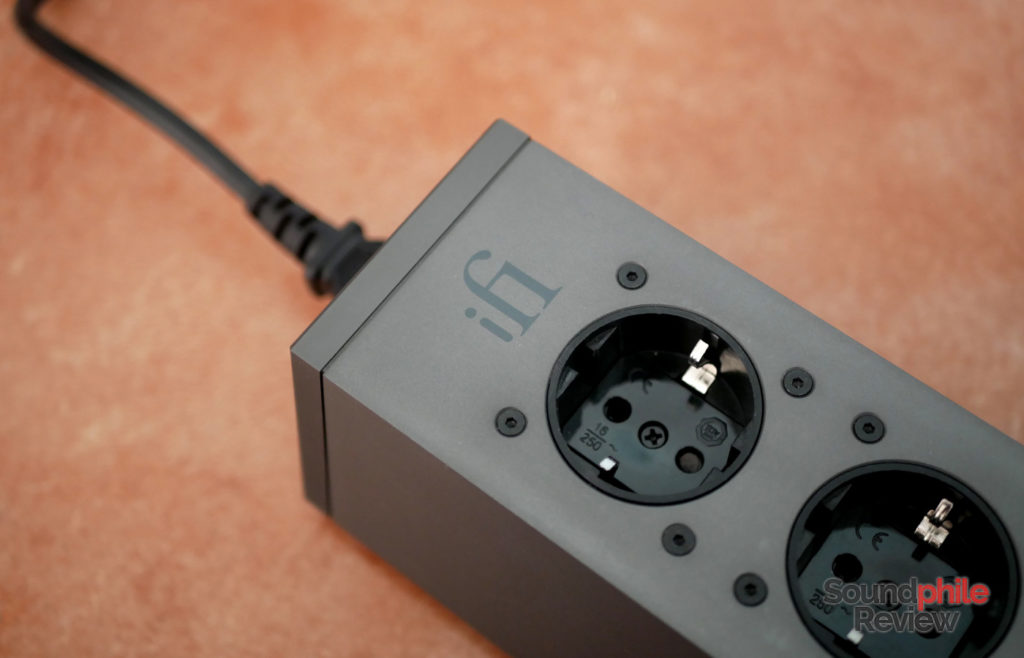
One one end there is the power button and the socket for the power cable. On the other end there is also an embedded iFi AC iPurifier which can’t be removed and which acts both as a status LED (it lights up when the PowerStation is turned on) and as an actual AC iPurifier, though the tech is applied to the whole multiple socket. The AC iPurifier also has a ground connector which one can use with record players.
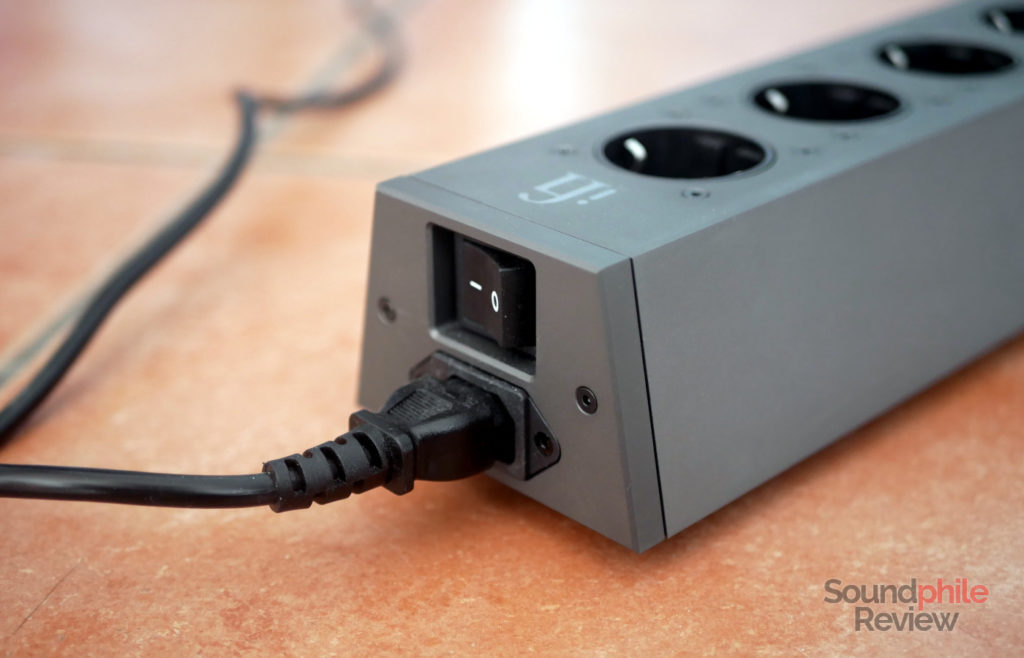
The PowerStation uses a power cable with a C15 (or C16, which is equivalent) connector. That means that it is possible to use it practically anywhere in the world, provided one can supply their own cable replacement. It also means that should something happen to the cable, one could easily replace it without the need to open the PowerStation.
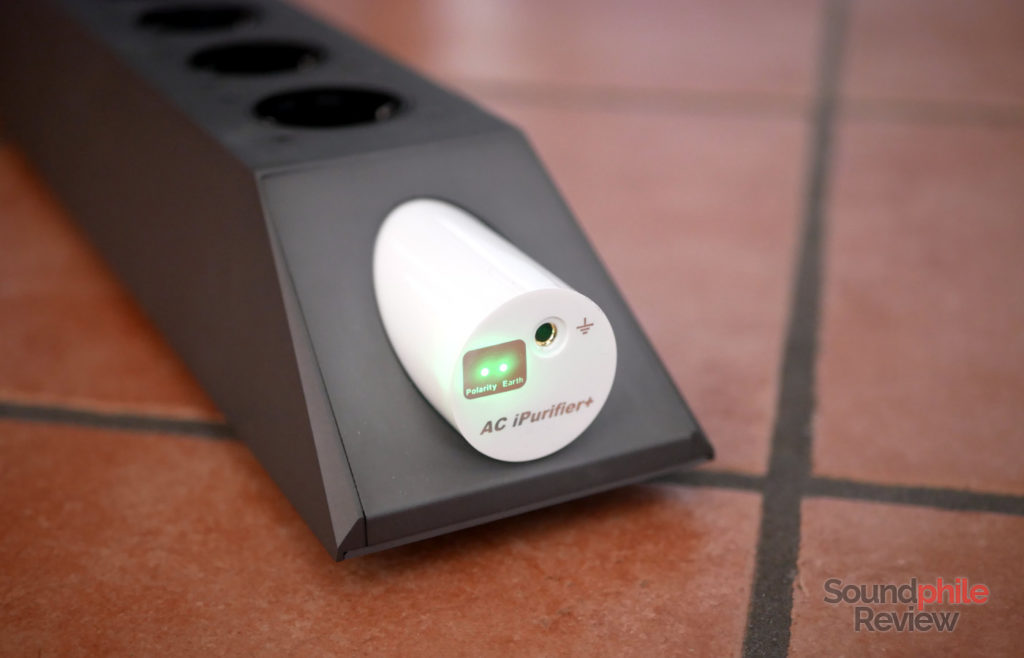
The metal is gunmetal in colour, with the underside coloured in black. The reference to how the PowerStation looks like a tank is not just because of the hard lines, but also because of the colour. There are apparent seams, but they contribute to the general aesthetics instead of taking away from them.
iFi built the PowerStation like… yeah, a tank. It’s heavy (~2 kg), but that’s because it’s solid metal. I would bet that it could be used as a weapon if properly accelerated. It looks and feels like a product that’s built to last, and that’s definitely not that common in the multiple sockets space.
Sound
I tested the PowerStation in my home in Italy, using the European (Schuko) power cord provided in the box. My test system is made of the iFi PowerStation to which are connected a Topping DX7, an APPJ PA1502A, a Little Dot MKIII SE and a Topping D30. Headphones used include the AKG K7XX, Moondrop A8 and Fearless Audio S10 Genie.
I’ve read people rave about how the PowerStation improved the soundstage, the imaging, how it made the sound “sweeter” and how it basically acted as an elixir that made everything better. I won’t question their subjective impression, but at the same time I have to remind there’s that thing called “placebo” in place. If there’s anything like that really going on, measurements of other similar devices could not pick it up and in this specific case I can’t hear it – and I would be somewhat angry with the manufacturers of my gear if their products were so badly designed that a well-made power strip could make that much difference.
Now, the PowerStation does only one thing, and it does that well. It removes noise from the power. I’ll be honest: I don’t know how it does that, I am no engineer and my technical understanding is limited. I do know that the noise in my Topping DX7, which has always been plagued by some background hiss, is reduced to the point it’s barely noticeable, whereas before it was definitely there. Most of the time I don’t hear it because it’s so low in volume that even faint sounds are enough to cover it. I call that a massive win in and by itself. Even if it does not improve the sound the way some people describe it, the fact that it removes most of the unwanted hisses and buzzes and humming makes the iFi PowerStation a product that I would actually want to be under my desk, period. Because that is what I call “improving the sound”: removing what’s not music so that you can actually concentrate on listening.
Final Thoughts
So let’s make this very clear: super expensive power cables, sockets and the likes are pure snake oil. They offer no improvement to the sound. The iFi PowerStation is different. It does not improve the sound in any way, as far as I can tell, but it does take away a lot of the noise coming from the power. That alone may be worth the price, if your power is really noisy. Of course an IEMatch costs a fraction of the PowerStation, but that’s only usable with some headphones and you can’t use it with speakers. It’s not working-class in price, but it does its job darn well.

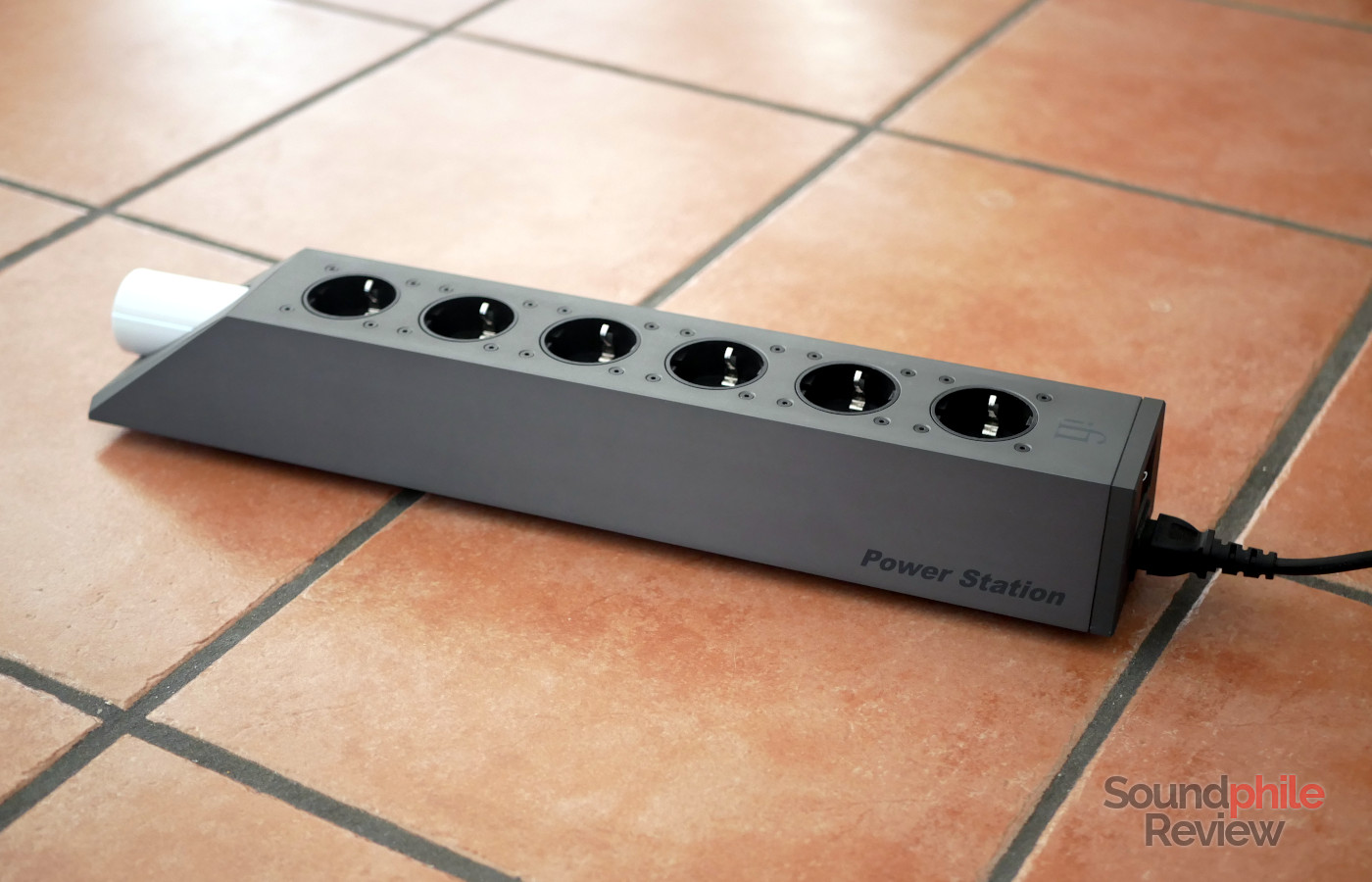

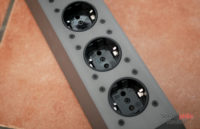
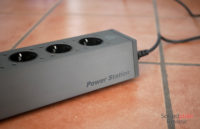

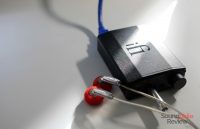
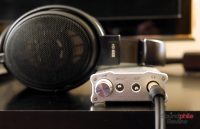

You state that the “Power Station does only one thing and it does that well. It removes noise..”. OK, but isn’t it also a surge protector? That would be another significant function that you made no mention of and thus is detrimental in describing this product.
Hello Robecchi
I read with interest your review I noted your comments that very expensive cables and sockets are snake oil . I would suggest that unless you have tried some I would not make such a sweeping statement . I suggest you evaluate products from Cardas Furatevj for starters
Hey there,
been there, done that. There have been scientific studies on the matter as well. Cables make no difference and that’s a basic fact of life, whether you like and/or believe it or not.
Also, I have yet to find anyone able to enlighten me as to why the small length of cable going from the socket to the speakers should magically “improve” the electric current and therefore the sound when the cables all the way from the socket to the power station are probably garbage (by the standards of the proponents of such snake oil). That part, the one from the socket to the power station, is always conveniently omitted by everyone.
I am a man of science and I don’t believe in magic, so I prefer not to take the coward approach of saying “maybe, if you have special ears, if you get the right synergy, if the Moon is aligned with Saturn and a virgin cries on the top of a mountain…”, but instead I favour being clear and firm in denouncing snake oil. Everyone is entitled to wasting their money as they see fit, but I will not be an accomplice of the huge scam that’s the audiophile market cable, thank you very much.
Better cables are able to shield against RFI and EMI that are emitted by your components. They also use proprietary materials that offer a better balance across the entire frequency spectrum. That said, unless the audio component are sufficient transparent, you would not be able to hear the difference as the components would mask the benefits. I am just offering explanations, not trying to convince anyone. My wife listens to music on her phone and thinks I am wasting money on my HiFi, let along thousands on power cords, interconnects and speaker cables. To each it’s own.
You have totally destroyed the credibility of your views and the conclusions in this article in saying that expensive power cables are snake oils. This tells me that either your ears are unable to discern the difference or your system is masking the benefits. Either way, this article is not worth the paper that is printed on.
As you said in your other comment, to each their own. You want to believe in magic? Your problem, I won’t prevent you from spending your money in whatever you like, even magical cables with the properties of unicorn hair. Even though, like too many people who believe in this kind of things, you have spouted your judgements without bringing anything to the debate. I made a point: why should the power cable make any difference if you use bad quality cables in the rest of your electrical power system? I think nobody will ever provide me with a satisfactory answer, simply because there isn’t one that doesn’t display very clearly the hypocritical and completely illogical arguments of “power cable believers”.
On the other hand, though, your comment really makes me sad as it is a good representation of these times we live in: using a rational, scientific approach to things is seen with suspect and destroys one’s credibility, whereas people who talk utter nonsense without any scientific base are cheered on. We see this in so many situations (creationism, no-vax, tarots, conspiracy theories…) and it’s always the same issue: people refusing to study and to accept the hard truth, preferring to hide in a made-up world that has no connection with reality. It’s a very sad state of affairs which I will continue to denounce, inside and outside of this blog, because doing otherwise would be unethical.
One last thing: no paper has ever been used to print my articles.
Each cables sounds different.Not necesary better..
Agreed
Hi, high quality (and therefore expensive) cables make a huge difference to the sound. I have upgraded for some time gradually from the ordinary to better quality cables and the difference is not some “magic”, it’s simply there, you can hear it, you can’t ignore it. Of course you also have to have high quality audio systems to fully benefit from high end cables. Otherwise, your review about ifi Powerstation was interesting, thank you and good luck!
Hello Martin! I am still looking for someone to give me proof, even just theoretical, of why that should be the case. So far no one has managed to provide any beyond “but I hear the difference!”, which I find insufficient (I’m quite demanding, I know).
Thanks for your compliment any way, good luck to you as well!
“Audiophiles” buy gold plated ethernet cables for thousands and yet they use the plain simple ones in datacenters everywhere. No reasoning with these people. Sunk cost fallacy & placebo does wonders.
I always suggest getting Fred Halsall’s “Computer networking and the Internet” to those people, it’s an eye opener when it comes to networking-related stuff (though a bit technical).
To argue over the internet is wasteful but, like others, I find your sweeping statements unpalatable.
There are 3 camps in HiFi. One that will believe anything the marketing says, 2 that will approach their HiFi sensibly and the third, yourself, that is adamant that a cable for a lawn mower has the same sonic qualities as a €3000 cable.
HiFi is subjective and, while sonic improvements are not scientifically measurable, people can still perceive differences. There’s an interesting post on Audioasylum from an electric engineer who is quite literally having his ears opened and on quite a journey whilst also being aware that, from a science perspective, he shouldn’t hear differences.
From your starting point of snake oil however, you should stop wasting air time abs stop reviewing as you are inherently prejudiced and should be dismissed as quickly as the subjects you dismiss.
I’ll just answer to this: “while sonic improvements are not scientifically measurable”. Then they can’t be proven and they’re akin to tarots and readings of tea leaves, or horoscopes. They’re worthless. I understand that the world is reneging on the values of Illuminism, and therefore the values of rationality and logic, but I won’t stand idle while this happens. All that evil needs to win is for good people to do nothing, so I will continue to try to do something. Case closed.
When you talk about “scientifically measurable” you have to state with what equipment was used to measure? Human perception is a lot more complex really, especially in the realm of spatial information, often the transient response, it’s not as simple as 44k rate 20-20k hz, the more information provided and kept intact the better, how the electrical current travel through the powerline *will* introduce noises of various kinds, even ever so slightly, but they are there, they are scientifically proven phenomenon, and they will get amplified by the amplifier too. There are people (me included) who can A/B the sound quality improvements with no issues, maybe you should go out and discuss with those people too, in real life, instead of behind the keyboard acting like you know everything.
I do not question that noise is introduced, I question the audibility of such noise. I would take your criticism if there was a debate in the scientific community about this. The thing is, there isn’t. Multiple studies have shown that people cannot reliably tell the difference. If you say you can, I invite you to contact a university and ask them if they’re interested in running a study (or join an ongoing one) so that your claims can be scientifically tested and subsequently proven or disputed.
As for “the more information provided and kept intact the better”: that’s not how the Nyquist theorem works.
To counter your last point, I don’t act like I know everything, it’s quite the contrary. I don’t have the arrogance of saying “people who spent their academic careers researching this topic know nothing, I am special and I know better”. I trust the scientific method and the results of research, and I openly say that people who are far more knowledgeable than me reached a certain conclusion and proved that conclusion was right, which is the exact opposite of acting like I know everything.
I totally understand your position regarding using science over voodoo in assessing audio components. The audiophile world has been taken over by people that have an elitist attitude towards their hobby and are taken in by snake oil salesmen who massage their customers ego’s into believing that they have exquisite and discerning taste and hearing who then go on to sell them products that cost ridiculous amounts of money for a small or even non existent improvement to their audio system.
Take a company like Synergistic Research with their acoustic dots or vibratrons for example, apart from the placebo effect neither product would make the slightest difference to any listening experience but the products would cost many thousands to purchase, audiophiles can act like a cult where criticism of their beliefs are treated with derision and any dissent is met with scorn, it really is off putting.
Anyone who think’s that spending anymore than a couple hundred for their systems cables is wasting their money as spending more will at most only produce minute changes. Anyone thinking of spending tens of thousands on audio components should hire a sound engineer for the day to audition components as they spend their careers paying close attention to fine audio details and won’t be swayed by fancy marketing and snake oil.
I’ll finish by committing audiophile blasphemy by saying that a good set of studio monitors and studio derived components can produce a rewarding sound for a fraction of the price of a voodoo inspired audio system.